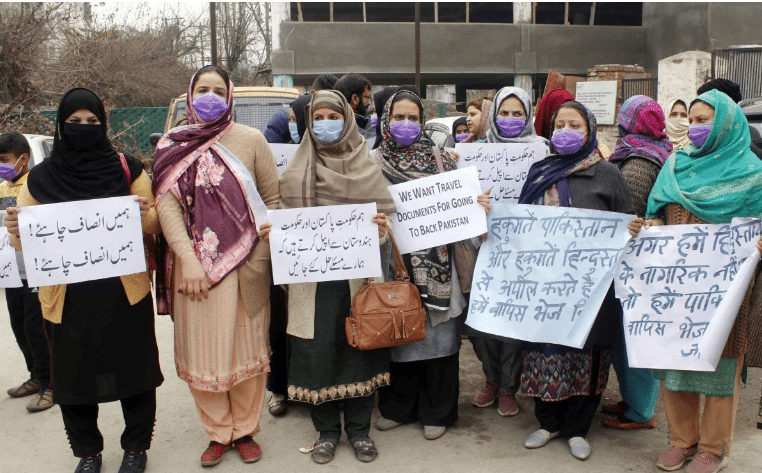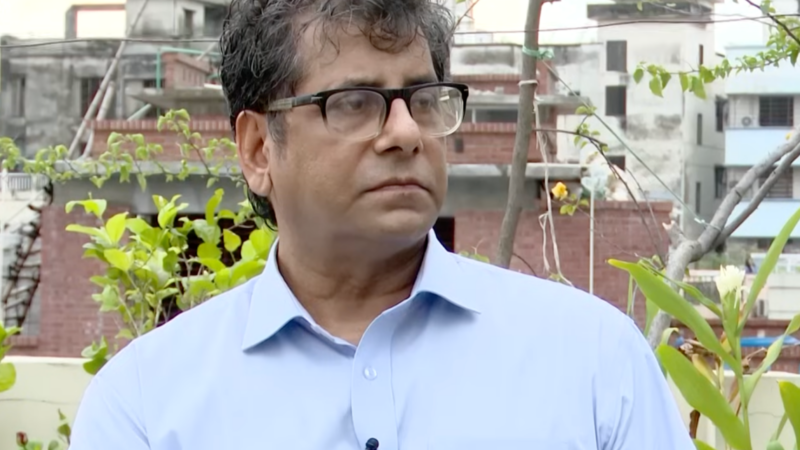Pakistani women without a nation in Indian-run Kashmir long for a place they can’t go.

At a time when India is in the process of granting citizenship to persecuted minorities from neighbouring countries, about 350 Pakistani women in a remote border town of Indian-administered Kashmir are left stranded with no hopes of a future on either side of the frontier.
Misbah Mushtaq, 30, came to Handwara town in the disputed area from Pakistan in 2015 with her husband, a former Kashmiri militant who crossed the border for weapons training in the early 1990s when an insurgency erupted in the Himalayan region.
Anger in remote parts of Indian-controlled Kashmir after 3 killed in army custody
23 Dec 2023
People shout slogans during a protest in Srinagar, in Indian Kashmir, on Saturday, after three civilians were killed while in army custody. Photo: EPA-EFE
As she busies herself decorating her new collection of dresses on the shelves of the shop that she has run for the past 1 1/2 years, there’s a void in her life. She had enjoyed stability in Pakistan’s capital Islamabad before her husband Mushtaq Ahmad, who ran a small business there, persuaded her to come to Indian-administered Kashmir for a better life.
India and Pakistan have clashed over control of Kashmir for decades, with three wars fought over the region. Like Misbah’s husband, many other Kashmiri youths also received weapons training after moving to Pakistan during the insurgency. Some militants did not return and settled in Pakistan, marrying locals.
In 2010, Indian officials in Jammu and Kashmir launched a rehabilitation policy for Kashmiri militants in Pakistan who had given up insurgent activities and were willing to return.
The scheme did not succeed as intended, however. The returning militants struggled to secure employment, their children faced difficulties gaining admission to schools, and Pakistani women were not permitted to return to their homeland, nor could they gain Indian citizenship.
Misbah Mushtaq at her clothes boutique in Handwara district, Indian-administered Kashmir. Photo: Umer Asif
Misbah Mushtaq at her clothes boutique in Handwara district, Indian-administered Kashmir. Photo: Umer Asif
Islamabad has said on several occasions that it is willing to take back the Pakistani women. The Pakistani embassy in India has also written to local authorities to allow these women to visit their old homes.
EVERY MONDAY
The most pressing stories and in-depth analysis from the Asia region, sent to you each week.
By submitting, you consent to receiving marketing emails from SCMP. If you don’t want these, tick here
GET OUR NEWSLETTER
By registering, you agree to ourT&CandPrivacy Policy
India’s Narendra Modi-led Bharatiya Janata Party government in March announced new rules to implement its Citizenship Amendment Act, which aims to grant Indian nationality to persecuted minorities – Hindus, Parsis, Sikhs, Buddhists, Jains and Christians – from three neighbouring Muslim-majority countries: Pakistan, Bangladesh and Afghanistan. It explicitly excludes Muslims.
Activists and human rights groups have called the law discriminatory and criticised New Delhi for targeting one religion.
My life is ruined here. All I want from the government is to deport me back. I will never return
Misbah Mushtaq, stranded wife of an ex-militant
Misbah said economic hardships, and more importantly the longing to see her family, made her life “miserable” in Indian-administered Kashmir.
“My life is ruined here. All I want from the government is to deport me back. I will never return,” she told This Week in Asia, underlining her growing frustration.
Losing hope
When Misbah, who has a seven-year-old child, and the other Pakistani women who married Kashmiri militants crossed into Indian-administered Kashmir, they did not know at the time that their trip would be one-way. Ever since, they have remained stuck without any valid travel documents.
“We came with the hope that we will get a better life. But that was not the case,” Misbah said.
Under Jammu and Kashmir’s rehabilitation policy, the former rebels and their families were permitted to return to India only through border checkpoints at Wagah-Attari in Punjab, the Salamabad and Chakkan da Bagh crossings along The Line of Control separating Indian- and Pakistani-administered Kashmir, or through the airport in Delhi.
Can Shehbaz Sharif thaw Pakistan-India ties as Kashmir remains sticking point?
7 Mar 2024
Pakistan Prime Minister Shehbaz Sharif at a guard of honour ceremony in Islamabad on Monday. Photo: EPA-EFE
However, most ex-rebels and their families chose to avoid the permitted routes to evade scrutiny from the Pakistani and Indian security agencies.
In 2017, Jammu and Kashmir officials reported that 377 ex-rebels and 864 of their family members had returned from Pakistan via Nepal and Bangladesh. Because they used unapproved routes, they were ineligible for benefits under the amnesty policy.
Misbah and her husband used the Nepal route.
At the time, the authorities took in all families irrespective of whether they had valid documents. But when the women later tried to visit home, they were refused new travel documents by officials, citing security reasons.
“If we are illegal, why didn’t they [the authorities] send us back then only? We would have not faced such hardships,” Misbah said.
Pakistani women and their children demand travel documents to return to Pakistan at a protest in Srinagar, India-administered Kashmir. Photo: Umer Asif
Pakistani women and their children demand travel documents to return to Pakistan at a protest in Srinagar, India-administered Kashmir. Photo: Umer Asif
After India’s move in August 2019 to strip the part of Kashmir it administers of its special status and limited autonomy, ties between India and Pakistan fell to new lows.
Last month, Indian Union Minister Amit Shah defended the Citizenship Amendment Act, calling those living in what Delhi referred to as Pakistan-occupied Kashmir (PoK) citizens of India irrespective of their religion.
“PoK is part of India. The people of PoK are also Indians – be they Hindu or Muslim. Both Hindus and Muslims of PoK are our own,” Shah said on the sidelines of the India Today Conclave, an annual conference held in Delhi.
Sheikh Showkat Hussain, a political commentator and retired professor of international law and human rights, said if the Indian government considered Pakistan-administered Kashmir a part of India, it should grant citizenship to Pakistani women married to residents of Jammu and Kashmir.
Anniversary of loss of special status for Indian-held Kashmir sparks protests on Pakistan side
“Many of these women belong to Muzzafarabad [Pakistani Kashmir’s capital city] which India claims is a part of India. So, if somebody has travelled from that side to this side [India-administered Kashmir], then they are the natural citizens of India,” he told This Week in Asia.
“There is a specific law under Article 3 of the Indian constitution for Jammu and Kashmir under which these women can be made eligible for permanent citizenship,” Hussain added.
However, given the current political climate, Hussain said it seemed unlikely India would either allow these women to travel to their native land or grant them Indian citizenship.
India’s home department did not respond to repeated requests for comment on the issue.
‘I am all alone here’
Living in a different culture has not been easy for these women, many of whom later got divorced, leaving them estranged in an alien land.
Bushra Farooq came to Indian-administered Kashmir in 2012 with her husband, also a former militant, and two children. The couple divorced in 2019.
“Life is a struggle. I am all alone here with my children,” said Bushra, who hails from Muzaffarabad on the other side of the frontier, but now lives in Kupwara district, in Indian-administered Kashmir.
In October 2023, the Jammu and Kashmir home department formed a high-level committee to identify foreigners who had been illegally staying in the region since January 1, 2011.
Bushra Farooq (left) and Nusrat Rashid (right) work at their clothes boutique in Kupwara district, India-administered Kashmir. Photo: Umer Asif
Bushra Farooq (left) and Nusrat Rashid (right) work at their clothes boutique in Kupwara district, India-administered Kashmir. Photo: Umer Asif
“If we have illegally come here [to Indian-administered Kashmir] then we are appealing to the government to deport us. But the government is neither deporting us nor giving us travel documents,” Bushra said, noting that being a Muslim, she could not apply for citizenship under the Citizenship Amendment Act.
For over a decade, the only communication that women like Bushra had with their families was through their phones.
Social activist Nighat Shafi Pandit, who has worked with some of the women, said it was unfortunate that no one had listened to their plight for years.
“Many of these women after getting divorced were very vulnerable, that is when we came to their help in terms of providing economic and mental help,” Pandit said.
Nusrat Rashid (left), Saira (middle) and Bushra Farooq (right) at their boutique shop in Kupwara district, India-administered Kashmir. Photo: Umer Asif
Nusrat Rashid (left), Saira (middle) and Bushra Farooq (right) at their boutique shop in Kupwara district, India-administered Kashmir. Photo: Umer Asif
Pandit, chairwoman of the HELP Foundation for abandoned and orphaned children, said that she would again contact the authorities to argue the women’s case.
“To be very honest, it is very hard nowadays for us to rake up anything to do with Pakistan. But I will stick my neck out,” she said.
Nusrat Rashid, who also hails from the Muzaffarabad region originally, came to Indian-administered Kashmir in 2008 and got divorced in 2020.
“I was only 17 years old when I got married and my husband brought me here. I am just passing my days here now,” Nusrat said.
Modi welcomes ‘historic’ Indian court ruling ending Kashmir’s special status
11 Dec 2023
India’s Narendra Modi has praised a ‘historic’ court ruling that has revoked the region of Kashmir’s autonomy. Photo: dpa
A mother of two daughters, Nusrat said she had been working hard and struggling to make ends meet ever since her divorce.
While in Indian-administered Kashmir, Nusrat lost her father, and Misbah’s brother got married, but neither were able to join their families to mark the occasions.
“It was through a video call that I saw my father for the last time,” Nusrat told This Week in Asia, her voice filled with sadness.






